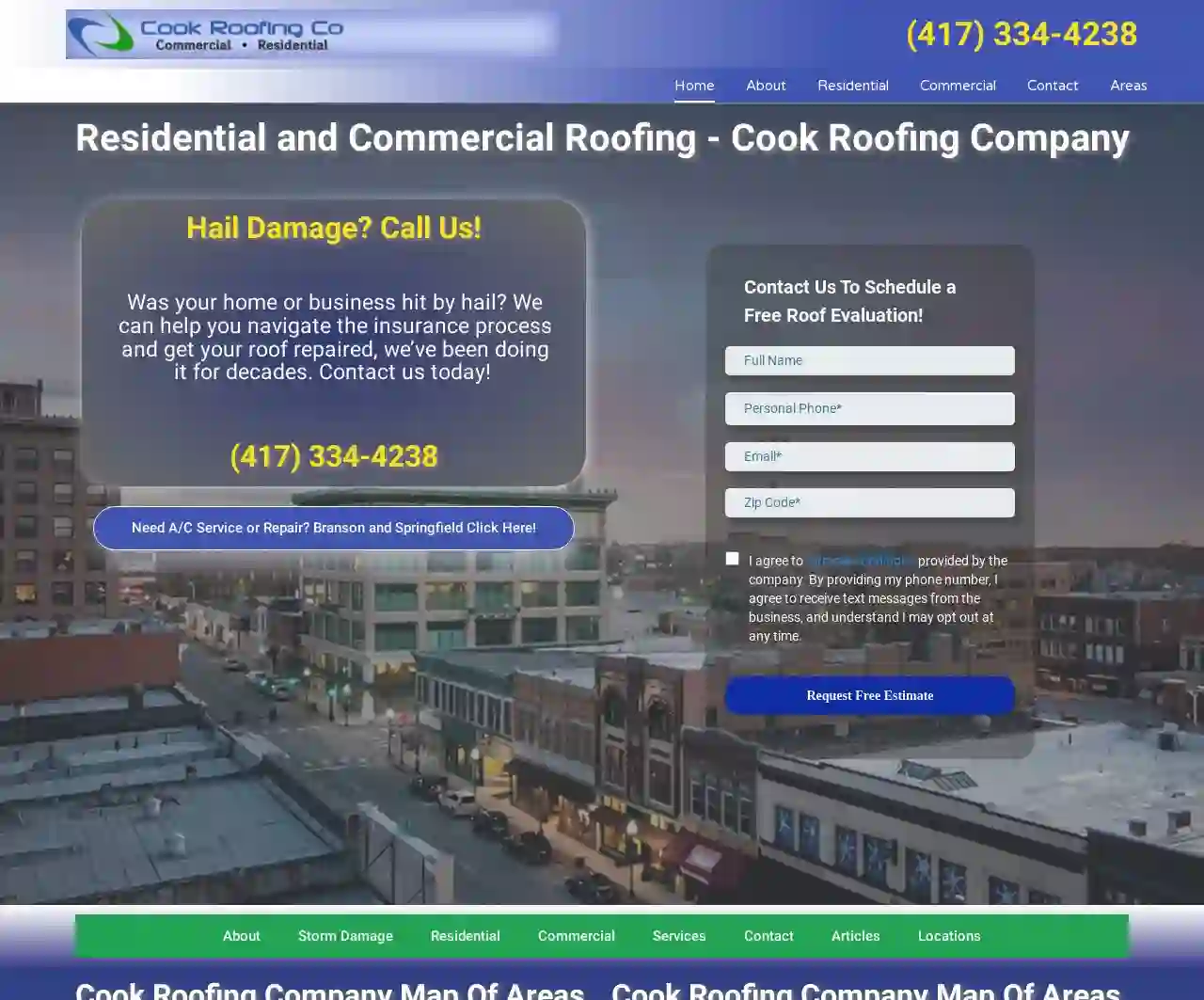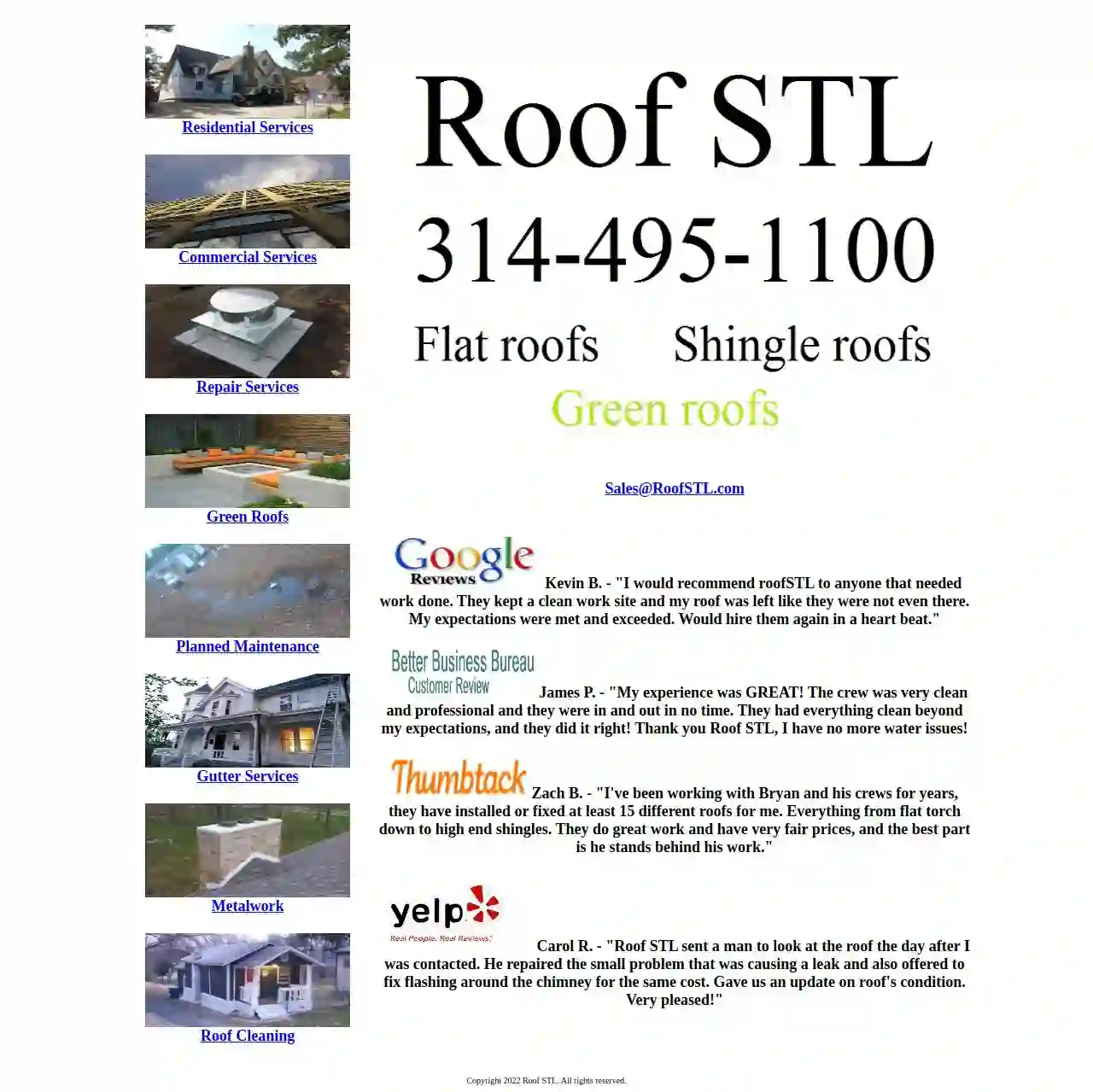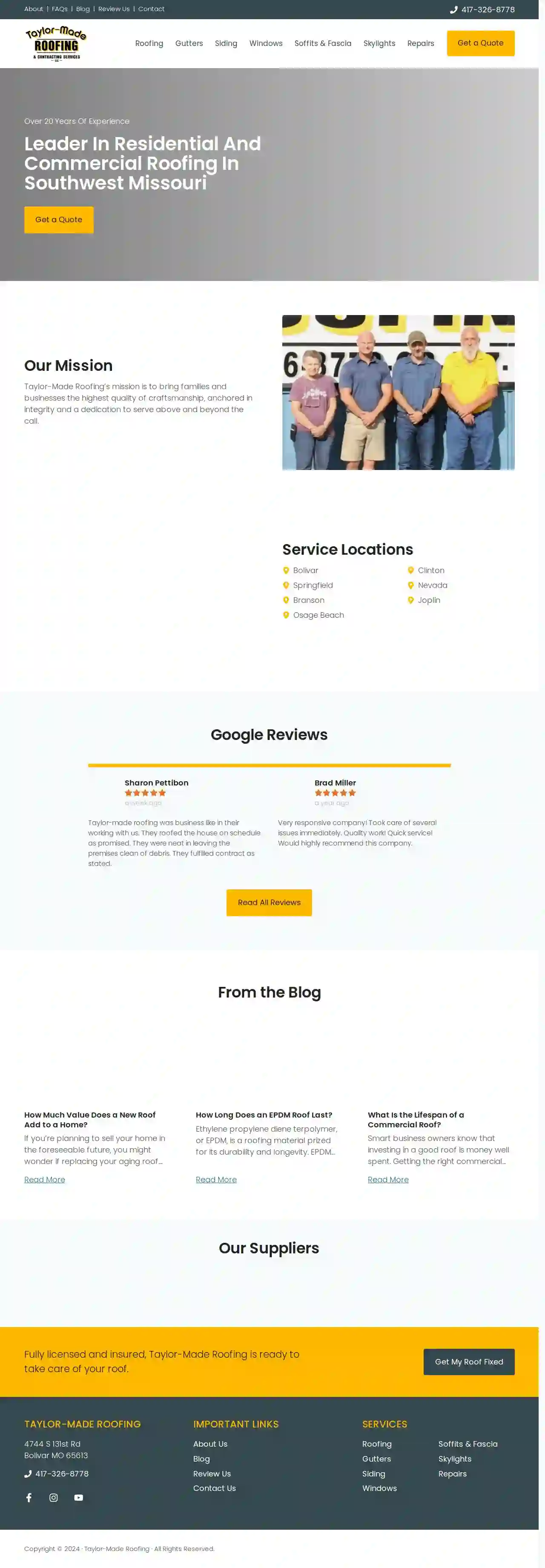Roofing Companies Sedalia
Top 10 Roofing Services in Sedalia
Get 3 FREE Roofing Service quotes for your project today! Compare profiles, reviews, accreditations, portfolio, etc... and choose the best service.

Cook Roofing Company
4.219 reviewsSt. Louis, US- Services
- Why Us?
- Gallery
Get Quote
Missouri Ozark Roofing of SEMO LLC
3.73 reviewsSt. Louis, USMissouri Ozark Roofing of SEMO, LLC is a locally owned and operated Roofing Company located in Senath, MO. We are committed to Excellence, Integrity, and Waterproofing! We are fully licensed and insured giving our customers a piece of mind they are choosing the right Roofing Professionals to protect their investment. We strive to make the process of Repairing, Replacing, Maintaining, or Installing their Roofing System a stress-free experience knowing they trusted their Local Roofing Experts to help guide them through the process. We take pride in assisting our customers in selecting the right Roofing System for their needs, desires, and budgets.
- Services
- Why Us?
- Our Team
- Gallery
Get Quote
Roof STL
3.114 reviewsSt. Louis, USRoof STL is your trusted partner for all your roofing needs in St. Louis. We specialize in providing high-quality residential and commercial roofing services, ensuring your property is protected and looking its best. With years of experience and a team of skilled professionals, we deliver exceptional workmanship and customer satisfaction. From new roof installations to repairs and maintenance, we handle every project with precision and care. We are committed to using premium materials and the latest roofing techniques to exceed your expectations. Contact us today for a free estimate and let Roof STL take care of your roofing needs.
- Services
- Why Us?
- Testimonials
- Gallery
Get Quote
Frederic Roofing Company
4.7155 reviews2827 S. Brentwood Blvd, St. Louis, 63144, USFrederic Roofing is a professional roofing company serving the St. Louis community for over 95 years. Our team of skilled and experienced professionals are dedicated to providing high-quality roofing services to both residential and commercial clients. With over 90,000 satisfied customers, contact us today for your roof repair or replacement needs.
- Services
- Why Us?
- Testimonials
- Gallery
Get Quote
Rely Flat Roof Company St Louis
32 reviews3748 McKelvey Road, St. Louis, 63044, USYou can rely on us! Rely Roofing specializes in all types of flat roofing. Our experts will determine which flat roofing system is best for you based on your building type and your budget. One of the few disadvantages of flat roofs is their penchant for collecting water. While rain can be a minor inconvenience for people, excess water can cause major problems for flat roofs if left untreated. But if addressed within the first couple of days of pooling, the better the chance that water damage can be prevented. Even simple things like keeping drains free of debris and checking coating seams for leaks can help make your investment last even longer. Our Core Services Emergency Service Flat Roof Repairs Flat Roof Restoration Flat Roof Installation Emergency Service A bad storm occurs. A tree falls. Lightning strikes. Anything can happen. As an owner of a commercial building or residential property, an emergency concerning your roof can seem like a bad dream, especially if the damage occurs in the middle of the night. That’s why Rely Roofing offers a 24-hour Emergency Repair Service. Our prompt callback time ensures you will never be left waiting, wondering, or worrying. Flat Roof Repairs Rely Roofing has been repairing flat roofs in the St. Louis area since 1976. If there is a leak in the roof of your home or business, we’ll find it and fix it with superior workmanship and flat roofing material. Flat Roof Restoration Restoring your existing roof can extend it’s life up to 10 years and is more cost-effective than flat roof replacement. Rely Roofing’s reflective coating reverts up to 90% of the heat given off by the sun, keeping energy bills affordable. Ask us about TPO roofing and modified bitumen. Flat Roof Installation When maintenance and repair aren’t enough, Rely Roofing guarantees the right roof for the right cost, every time. Our experts will determine which flat roofing system is best for you based on your building type and budget. Commercial Roofing, Residential, and More... Commercial Roofing Weather can make your need for roof repair very apparent. Whether from water damage or a flat roof leak, you need a professional like Rely Roofing. Our experience and expertise make us the best choice for flat and metal roof maintenance. We handle both industrial and commercial roofing including repairs, restoration, replacement, and retrofitting. When you have a flat roofing issue call us as our professionals have the expertise and the knowledge to get the job done right. Residential Roofing At Rely Roofing, we understand the importance of a well-maintained and leak-free roof in your home. Our residential flat roofing service specializes in addressing the unique demands of flat roofing systems commonly found in homes. Whether it’s a minor repair, an upgrade in the installation or a complete roof replacement, our experienced roof technicians are equipped to handle all of your residential flat roofing needs. More Than Just Flat Roof Repairs Rely Roofing does more than just repair roof damage. Here is a list of other services we offer: Metal Roof Service New Roof Installation Flat Roof Maintenance Flat Roof Restoration Roof Surface Types TPO Modified bitumen Built-up roofs -- with or without gravel EPDM Rubber roofs -- with or without ballast rock PVC Roofing
- Services
- Why Us?
- Our Team
- Testimonials
- Gallery
Get Quote
ROOF U.S.
5157 reviewsSuite 104, 5053 S Providence Rd, Columbia, 65203, USAt Roof U.S., we understand the value of quality service throughout the process. As a second-generation family-owned business, we look forward to helping our customers find peace of mind knowing their loved ones are safe under their own roof. We make it easy to get started with free estimates for all our roofing services and offer fair and competitive pricing for all customers. Our quality workmanship warranty is more than our competition’s and is in addition to the 50-year manufacturer warranty. We want our clients to have a wonderful experience with our roofing services from start to finish. As a roofing services contractor in Columbia, MO since 2010, the skilled team at ROOF U.S. remains dedicated to providing superior customer service, well-crafted roof installations, and insurance claim management for our customers. Our roofing contractors have brought quality and high standards to every job for over a decade. In Central Missouri, we experience all types of weather. Rain, snow, sleet, hail damage, extreme heat—we get it all. Trusted local roofers are vital to your house and business roofing project, especially with unpredictable weather. If it’s time to replace your current roof, don’t hesitate to contact the #1 roofing company in Columbia, MO: ROOF U.S.
- Services
- Why Us?
- Accreditations
- Our Team
- Testimonials
- Gallery
Get Quote
Missouri Roofing LLC
51 reviewsHouse Springs, 63051-1505, USMissouri Roofing LLC is a leading roofing company serving the local area. They pride themselves on being a trusted provider of high-quality roofing services, known for their experience, professionalism, and commitment to customer satisfaction. The company specializes in a range of services, including commercial roofing, hail and storm damage repair, roof maintenance, emergency roof repair, roof inspections, and general roof repair. Missouri Roofing LLC emphasizes their dedication to providing innovative solutions, saving clients time and money while maintaining the highest standards of workmanship. They are committed to honesty, quality, and transparency in all their dealings.
- Services
- Why Us?
- Gallery
Get Quote
Taylor-Made Roofing and Contracting Services, LLC
4.151 reviews4744 S 131st Rd, Bolivar, 65613, USTaylor-Made Roofing's mission is to bring families and businesses the highest quality of craftsmanship, anchored in integrity and a dedication to serve above and beyond the call. With over 20 years of experience, we are a leader in residential and commercial roofing in Southwest Missouri. Our team is fully licensed and insured, and we are committed to providing exceptional service to our customers.
- Services
- Why Us?
- Testimonials
- Gallery
Get Quote
MLK Roofing & Construction
4.786 reviews1215 S. Jefferson Ave, St. Louis, 63104, USMLK Construction is a professional roofing contractor that provides honest, professional roofing services in Saint Louis, Missouri, and surrounding areas. With over 20+ years of experience, we are the go-to roofing company that succeeds in leaving our customers happy. We service residential, commercial, and industrial customers, and handle all jobs and styles of roofing, including slate, flat, clay tile, and more. Our team is dedicated to providing precision and professional workmanship to ensure a perfect and sturdy roof for all situations.
- Services
- Why Us?
- Our Team
- Testimonials
- Gallery
Get Quote
St. Louis Synthetic Roofing
52 reviews3740 Brown Rd., St. Louis, 63114, USWith decades of experience in the Roof industry, the Roofing Contractor professionals at St. Louis Synthetic Roofing are our region's dedicated composite roof specialists. Whether you're in the market for new roofs made from Synthetic Wood Shake shingles, Composite Slate Roofing, or Synthetic Spanish Tile Roofs, our professional roofers can help you. We are the leading composite roofing experts in the St. Louis area and the midwest at large offering both residential roofing and commercial roofing solutions.
- Services
- Why Us?
- Gallery
Get Quote
Over 17,196+ Roofers on our platform
Our roofing contractors operate in Sedalia & surroundings!
Roofyng.com has curated and vetted the Best Roofing Businesses in and around Sedalia. Find the most trustworthy business today.
Frequently Asked Questions About Roofing Companies
- Listed Buildings: Buildings with historical or architectural significance.
- Conservation Areas: Areas with special architectural or historical character.
- Changes to Roof Design: If you're making significant alterations to the roof's design, such as adding a dormer window or changing the pitch.
- Clear the Area: Remove any vehicles, outdoor furniture, or other items from around your house to provide the roofing crew with easy access.
- Protect Landscaping: Cover plants, shrubs, and other landscaping elements near the house with tarps or plastic sheeting to protect them from falling debris.
- Clear the Attic: Remove or cover items stored in your attic, as dust and debris might fall through during the removal of the old roof.
- Notify Neighbors: It's courteous to inform your neighbors about the upcoming roof replacement project, especially if it's likely to be noisy or disruptive.
- Discuss Logistics with the Contractor: Coordinate with the roofing contractor regarding access to your property, parking arrangements, and any special instructions or concerns you have.
- Hot Climates: Opt for light-colored or reflective roofing materials to reduce heat absorption. Consider tile roofs for their thermal mass and heat resistance.
- Cold Climates: Ensure your roof has adequate insulation and ventilation to prevent ice dams and moisture buildup. Metal roofs can shed snow effectively.
- High-Wind Areas: Choose roofing systems with high wind ratings and properly installed hurricane straps or clips to enhance wind resistance.
- Areas with Heavy Rainfall: Ensure your roof has proper drainage and a waterproof membrane to prevent leaks.
Do I need planning permission to replace my roof in the USA?
How often should I clean my gutters?
How do I prepare for a roof replacement?
How do I choose the right type of roof for my climate?
Do I need planning permission to replace my roof in the USA?
- Listed Buildings: Buildings with historical or architectural significance.
- Conservation Areas: Areas with special architectural or historical character.
- Changes to Roof Design: If you're making significant alterations to the roof's design, such as adding a dormer window or changing the pitch.
How often should I clean my gutters?
How do I prepare for a roof replacement?
- Clear the Area: Remove any vehicles, outdoor furniture, or other items from around your house to provide the roofing crew with easy access.
- Protect Landscaping: Cover plants, shrubs, and other landscaping elements near the house with tarps or plastic sheeting to protect them from falling debris.
- Clear the Attic: Remove or cover items stored in your attic, as dust and debris might fall through during the removal of the old roof.
- Notify Neighbors: It's courteous to inform your neighbors about the upcoming roof replacement project, especially if it's likely to be noisy or disruptive.
- Discuss Logistics with the Contractor: Coordinate with the roofing contractor regarding access to your property, parking arrangements, and any special instructions or concerns you have.
How do I choose the right type of roof for my climate?
- Hot Climates: Opt for light-colored or reflective roofing materials to reduce heat absorption. Consider tile roofs for their thermal mass and heat resistance.
- Cold Climates: Ensure your roof has adequate insulation and ventilation to prevent ice dams and moisture buildup. Metal roofs can shed snow effectively.
- High-Wind Areas: Choose roofing systems with high wind ratings and properly installed hurricane straps or clips to enhance wind resistance.
- Areas with Heavy Rainfall: Ensure your roof has proper drainage and a waterproof membrane to prevent leaks.